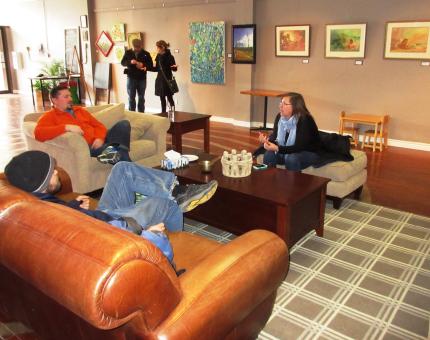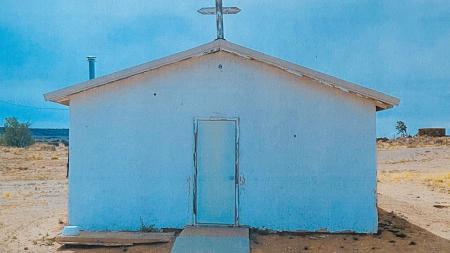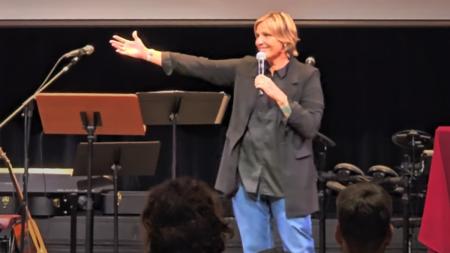Taking an Incarnational Path to Church Planting

Allen Kleine Deters talks in the background while his wife, Freda, speaks with two church members .
Chris Meehan
In June 2016 the Christian Reformed Church in North America released its new ministry plan, Our Journey 2020, which lays out goals for denominational agencies and congregations in their callings and ministries. As part of the ministry plan, the CRC is sharing glimpses of ministry occurring in congregations across North America. Recently CRC news reporter Chris Meehan took a short journey to see how the CRC is joining with God to do ministry in southern Ontario. Here is the second of his reports. This one is on three Christian Reformed Home Missions “missional” church plants.
Not far from the rainbow mist rising off the plunging waters of Niagara Falls and the tourist district crowded with chain hotels, casinos, and restaurants is a slice of the Canadian city in which many of the area poor live. It is also where a small Christian Reformed Church is reaching out to the local community.
Called the Bridge, the church is located in a downtown Niagara Falls, Ont., storefront that has been refurbished to serve as a meeting and worship space. Sitting on couches inside as I arrive are two church members and Freda Kleine Deters.
Kleine Deters’ husband, Allen, the church pastor, is showing a local artist around the space at her request to see if she might want to rent it out for an arts competition.
Open and filled with sunlight on this early March afternoon, this large space is called the Hub and is where members of the church meet two Sundays a month for worship and on other Sundays and various times to discuss Scripture and how their lives are going.
This is what is called a “missional community.” It’s a church without the traditional trappings — such as pews and stained glass and a preaching platform — and it is taking shape slowly as the needs and desires of the people who live in the surrounding neighborhood come to light.
“When we came here in 2014, we didn’t know who would jump on board,” Allen Kleine Deters told me earlier over a cup of coffee in a local coffee shop.
“What happened is that Freda and I met our neighbors, and that is where it started. Church planting in this way is hard, but it is good because it decentralizes the ministry — we go to where the people are.
“In the past couple years we’ve developed a good core team of Christian people — some are are CRC, Anglican, Pentecostal, Brethren in Christ.”
Some people who heard about this effort have even sold their houses from outside the area and have moved here to be part of this emerging congregation — a movement that is Spirit-driven and part of a search for connection with other like-minded people, said Kleine Deters.
A veteran of more than 30 years of ministry in a range of settings, Kleine Deters said he had a “burning in [his] gut” to leave a regular CRC congregation and start this type of ministry — a ministry in which he and his wife could embed themselves in the neighborhood.
To make ends meet, Kleine Deters works in a local cigar shop and plays the blues in area bars. His wife is a special ed teacher.
“We believe that God planted us here to be a Jesus presence. We believe this is where the church needs to be, and we’re making it happen,” said Kleine Deters, who once worked as a journalist and rode horses in a rodeo.
The two young men sitting on couches in the Hub and talking with Freda Kleine Deters on this day are Chris Hamming and Chris Clarke, both of whom say they were drawn to the Bridge because of its approach to incorporating close friendships with the gospel, and especially building relationships with people living in the neighborhood.
As part of this process, Hamming and Clark have spent many hours “exegeting” or doing a deep study of the neighborhood by poring over census tracts and interviewing librarians, city officials, businesspeople, and neighbors in their homes to get a good read on who is living within a few blocks of the church.
“We want to be an incarnational ministry, and in order to do that we have to understand the community,” said Clarke, who is a seminary student. “We need to know this area and the people in it.”
Many of the people living nearby are known as “the working poor,” and, of those who have jobs, many do seasonal work on the other side of town in tourists shops and businesses near the falls. Many others are on disability.
“We are learning that there are many amazing and some sad stories out there, but no one has been listening. We see our mission as listening and trying to capture some of those stories,” said Hamming, a landscaper who got interested in doing hands-on missional ministry after taking a mission trip to Europe.
Currently the Bridge is involved in helping in different ways to revitalize the downtown area; it is also a partner with a food collection project, a home for single young adult mothers, and a local health center.
Describing their goal as being approachable people, Kleine Deters said, “We want to be the kind of people who draw others to us who have questions about the way we live and want to know more about our faith.”
The Village Church
A few miles west of the Bridge, in the small community of Thorold, is another CRC church plant called the Village Church. Its offices are located upstairs from a place that sells and fixes ice skates. Their Sunday worship, however, takes place at another location in a nearby school.
After spending the day involved in a program for church members and others, Hilda VanderKlippe, one of the members who helped begin the congregation, took time to talk about their missional church and its vision.
It is a vision that the founding pastor, Mike Collins, began not with Sunday worship in mind but instead with the goal of finding space in a local school where people could gather for breakfast and create art, learn to cook, take classes on parenting, and how to cope with divorce, among other things.
As the church has developed, they have served their community in various ways by at times going out and simply offering random acts of kindness, holding block parties, and organizing concerts in the park, said VanderKlippe.
They have connected with international students at a nearby college, adopted a school serving low-income students, and held many Bible studies, especially for people just starting out in the Christian faith. They are also one of the congregations that helped to plant the Bridge in nearby Niagara Falls.
Every Sunday, they visit a local nursing home or retirement community, sharing their faith and friendship with residents who have a hard time getting out.
“But an important part of our ministry has always been the prayer walks we have done in the community,” said VanderKlippe. “From the time we moved here, we have been praying.”
The Village has attracted people of all ages, including an elderly man who was not a churchgoer but was attracted here after taking a Tai Chi class at the school on those early Sundays.
“We have a number of people who had walked away from church for different reasons, and some who have had no church background at all,” said VanderKlippe.
“For many people in our world today, God is not a driving thought, and church even less so — and we want to be here to be an incarnational presence for them. But we don’t push people. We let them decide if they want to be part of our community.”
Crosstowne Church
New construction of homes and apartments greets visitors as they enter the city of Milton, Ont. In this growing town outside Toronto, you’ll find Crosstowne CRC, a Home Missions church plant led by John Bouwers and located in a former Salvation Army facility in a strip of new business buildings near the center of the city.
“When we started out a couple of years ago, we went where the cops told us to go — a low-income, government apartment complex — and held barbecues for the people,” he said.
At first, apartment residents were skittish, wondering if Crosstowne members would try to convert them between the main meal and dessert, said Bouwers, who worked as an engineer for several years before getting into a career in ministry.
As part of his outreach, he met a couple of Muslim men who worked at a local party store, and he struck up a friendship with them. Over time they found ways to talk about their two faiths.
Bouwers has also met and spoken with people who have no faith at all. While the city of Milton is booming, many of its residents, especially those living near downtown, are not.
“The new part of Milton is doing fine, but there are many people in this area who are down-and-out. They are living in visible poverty,” said Bouwers.
His church collects coats for local residents in need during the winter. On Sundays, people share a home-cooked breakfast and worship, often as they gather around tables in an area that doubles for other purposes during the week.
An important theme of his ministry, said Bouwer, is to “take time to waste time” with people. He likes to slow things down, to sit and simply chat — and not necessarily about weighty theological topics.
“Jesus was one who was willing to waste time’ with people — like think of the time he spent with the Samaritan woman at the well,” he said.
“I think we need to open up that vast space to spend time with people, because if you don’t, evangelism and discipleship will never happen.
“When you think of it, being incarnational, living life with others and with God, it is so awesome. You don’t have to come to save a whole city, but you try to be available to the people around you.”
A leader in church planting efforts in southern Ontario, Bouwers is helping to lead a gathering in Niagara-on-the Lake Mar. 26-28 for church planters in southern Ontario who want to pray, imagine, and plan around one simple vision:
"What would it take for the CRCNA in eastern Canada to begin to plant three to five churches a year over the next 15 years?” he asked.


